Politics
Keir Starmer defends corporate seats for Arsenal games
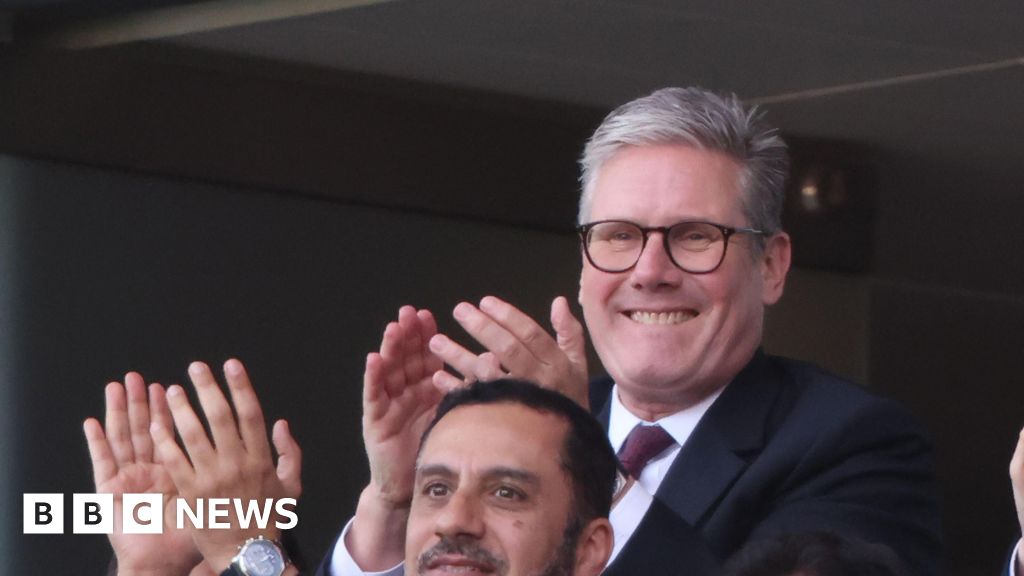
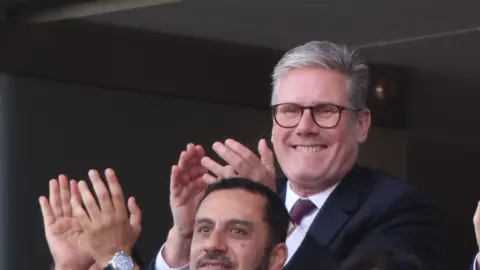 Alamy
AlamySir Keir Starmer has defended his decision to accept corporate hospitality from Arsenal football club, arguing he can no longer use his normal seats as prime minister.
The Premier League club has made two seats available to Sir Keir, a season-ticket holder, in the corporate area of Emirates Stadium.
In interviews with BBC regional political editors, he said he had been advised it would cost the taxpayer more in security costs to use his normal seat.
He added that he would “rather be in the stands”, but that accepting a corporate ticket was a “perfectly sensible arrangement”.
It comes amid recent scrutiny of gifts received by both the prime minister and his wife Victoria, including clothes gifted to her by a Labour donor.
Sir Keir, a longtime season ticket holder at Arsenal’s Emirates Stadium, has been spotted attending both the club’s home and away games, most recently at the club’s opening match this season against Wolves at home last month.
He has declared just over £12,000 worth of tickets and hospitality for Arsenal matches, from both the club itself, other clubs, the Premier League and commercial companies, since becoming Labour leader in 2020.
Speaking to BBC London political editor Tim Donovan, Sir Keir said he had been following Arsenal from the stands for “many, many years”, but “a lot of policing” would be required for him to continue doing this as prime minister.
He added that he would not be giving up his season ticket, but confirmed Arsenal had “made arrangements for me to watch from elsewhere”.
‘Common sense’
He did not confirm whether this would be in a corporate box, adding he did not want to say exactly where his seat would be.
The prime minister is expected to declare corporate tickets to games he attends as a benefit in kind in his MP’s register, with an approximate value given.
In a separate interview with BBC Yorkshire political editor James Vincent, Sir Keir said it would cost the taxpayer “a fortune” in extra security for him to watch games from the stands.
He added people would consider it “pretty self-indulgent if I said I’m not going to move from the stands, even if it costs the taxpayer more money”.
“Frankly, I’d rather be in the stands, but I’m not going to ask the taxpayer to indulge me to be in the stands, when I could go and sit somewhere else.
“That’s for me, a common sense situation,” he added.
Scrutiny of gifts
News of Sir Keir’s decision to accept hospitality from Arsenal comes amid renewed scrutiny of the gifts and hospitality he has accepted.
The prime minister has faced criticism for missing a deadline to declare clothes gifted to his wife by Labour donor Lord Waheed Alli, only doing so more recently following “further advice” on the declaration rules.
Lord Alli was also at the centre of a row last month, after it emerged he had been given a temporary Downing Street pass.
The TV executive, a regular Labour donor, has also bought clothes and glasses for Sir Keir, according to the prime minister’s parliamentary declarations.
Records show he has accepted tens of thousands of pounds in gifts, hospitality and tickets to events since becoming Labour leader, including nearly £66,000 over the last year.
This includes £20,437 from Lord Alli for accommodation, along with £16,200 in clothes and “multiple pairs of glasses” worth a total of £2,485.
He also declared four tickets worth £4,000 from the Premier League for a Taylor Swift concert, where he was pictured alongside his wife.
Although Sir Keir is far from the only MP to have accepted freebies, former deputy Labour leader Harriet Harman said his decision to accept so many gifts was a “misstep”, and his decision to justify it was “making things worse”.
“I don’t think he should do sackcloth and ashes, I think that’s overdoing it,” she told a Sky News podcast.
“He just needs to say ‘with hindsight, I’m going to do things differently’,” she said.
Politics
Biden Fed Jay Powell meeting Oval Office
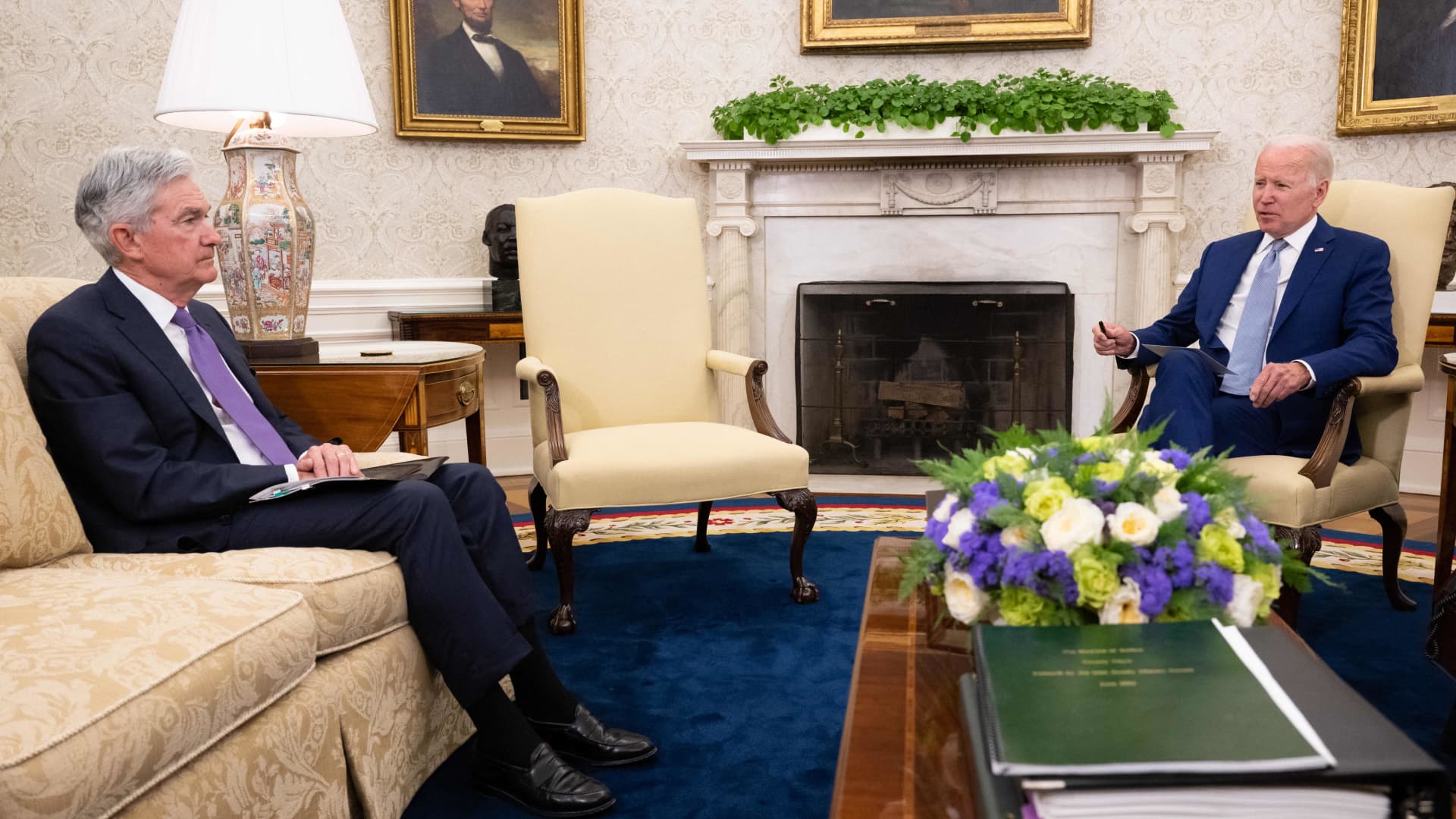
Chairman of the Federal Reserve Jerome Powell (left) meets with President Joe Biden in the Oval Office on May 31, 2022.
Saul Loeb | AFP | Getty Images
President Joe Biden on Thursday said he had “never once spoken” to Federal Reserve Chair Jerome Powell while he was president.
But the pair, joined by Treasury Secretary Janet Yellen, met in the Oval Office on May 31, 2022 to discuss inflation, photos and videos from the meeting show.
The president made the inaccurate claim during remarks at the Economic Club of Washington, D.C., the day after the Fed announced a decision to cut interest rates by 50 basis points.
Touting his own respect for the independence of the central bank, Biden said “By the way, I’ve never once spoken to the chairman of the Fed since I became president.”
Asked about the apparently inaccurate recollection by a reporter at Thursday’s White House press briefing, Council of Economic Advisors Chair Jared Bernstein said Biden had been referring only to discussions about interest rates.
“The president was saying that he has not spoken to Chair Powell about interest rates,” said Bernstein. “He did not pressure Powell and has never done so.”
But the error undercut Biden’s critique of Republican former President Donald Trump, who has threatened to challenge the independence of the Federal Reserve if he is elected to a second term.
“Unlike my predecessor, I respect the Federal Reserve’s independence as they pursue its mandate to bring inflation down. That independence has served the country well,” Biden said Thursday.
“It would also do enormous damage to our economy that independence was ever lost.”
Even in his 2022 Oval Office meeting with Powell, Biden stressed the importance of the Fed’s independence in addressing inflation.
“My plan to address inflation starts with a simple proposition: Respect the Fed. Respect the Fed’s independence,” Biden said at the time. “My job as president is not to not only nominate highly qualified individuals for that institution, but to give them the space they need to do their job.”
Trump, the Republican nominee for president, said in August that presidents should “have at least [a] say” about the Fed’s decisions on interest rates.
“Yeah, I feel that strongly,” Trump said at a Mar-a-Lago press conference on Aug. 8.
“I think that in my case, I made a lot of money, I was very successful, and I think I have a better instinct than, in many cases, people that would be on the Federal Reserve or the chairman.”
The Wall Street Journal reported earlier this year that Trump advisors were putting together a plan that would inject Trump into the Fed’s interest rate decision-making process, if the Republican returns to the White House in January.
Politics
With a lust for freebies and hobbled by infighting, Labour look like the Tories 2.0 | John Crace
During the last election campaign it was hard to escape the impression that, whatever his other faults, Rishi Sunak just wasn’t very good at politics. The charge sheet included getting drenched announcing the election and leaving D-day veterans on the beaches. And insisting that black was white: that he was stopping the boats, that the economy was in good shape, that the Tories were on course for victory.
Just a couple of months later, it very much feels like Keir Starmer and Labour are saying: “Hold my beer.” Keen to prove that they, too, are amateurs at the political PR game. It’s almost as if there is something about being in government that makes fools of everyone. Though few would have imagined that Labour could manage it quite so quickly. A period of grace would have been more fitting.
Take the freebies. And Keir has. The Arsenal tickets. The Taylor Swift tickets. The suits. The designer glasses. The clothes for his wife. Starmer’s big shtick was that he was going to do politics differently. The antidote to Tory corruption and scandal. A man who could be trusted. He was one of us. So why put himself in a position where you can so easily be criticised by the rightwing press?
If you want to set yourself up as a model of propriety then you can’t start making exceptions. Especially not so early on. A couple of years in and people may not notice so much. You have to be above reproach. Yes, it might be a loss not to go to the football. And you might resent having to buy a few more suits for yourself. But that all rather goes with the job. Being prime minister may be a career highlight for a politician but you have to take the downsides.
Perhaps Starmer has been too honest for his own good. Maybe he should have been more like Boris Johnson. Keir has made himself accountable by listing his freebies in detail. We know exactly where all the money went. With Boris we are largely in the dark. He took whopping gifts from all sorts of undesirables and we aren’t entirely sure of the details. Being prime minister was a licence for Boris to cash in. No one expected any different from him. He never pretended to be on the side of the angels.
Then there is the question of Sue Gray’s pay. You could say that someone should have suggested that Sue drop £4,000 in salary just for appearances. So she earned less than the prime minister. Maybe throw in a clothes allowance and an events expense account to make up the difference. No one will notice. Surely. I guess she is a tough negotiator. One of the reasons she was made chief of staff.
But all this is not really the point. The issue is why the Labour party is indulging in open feuds with itself by leaking the story in the first place. We were promised a government of service and yet it already appears to be totally dysfunctional. It’s as if Starmer has taken the Tories as his role model. How did it come to this that half of the No 10 top team hate the other half? And vice versa. Couldn’t someone have just got in a therapist? Or at the very least established a workplace culture where people talked to one another? Or – and here’s a thought – pay junior staff the proper rate?
Still, Keir isn’t entirely a slow learner. There’s a tradition that prime ministers do a round of regional radio stations on the Thursday before a party conference. But after the last two years, when Liz Truss and Sunak had an hour they would rather forget, Starmer decided to reset the format to pre-recorded outings where he hoped there would be less room for disaster. All the interviews would be released at 5pm when he hoped no one would be watching.
So it was left to the business secretary, Jonathan Reynolds, to do the morning media round. An experience he would rather forget. Reynolds comes across as a decent man but too much more of this and he will find himself Labour’s answer to Mel Stride. The minister who gets to do the rubbish jobs that no one else will. In future, on days like this, I am sure he will learn to put his phone on mute and not take calls from the No 10 comms team. It’s early days, I suppose.
On Times Radio, Aasmah Mir cut to the chase. Why did Starmer accept so many freebies? Reynolds forgot to engage his brain. It was like this, he said. Politicians get invited to events all the time and it would be rude not to go. It was the way people tried to engage with decision makers. Sure thing. That’s why it was vital for Boris Johnson to accept a freebie to Evgeny Lebedev’s party in Italy. And a Taylor Swift concert is a prerequisite for stopping the winter fuel allowance.
It very much sounded as if he was talking about the perks of the job, said Mir. Oh no, replied Reynolds. Far from it. Perish the thought. Just that politicians worked extremely hard and deserved a little downtime. Especially if they didn’t have to pay for it. The thought occurred that if Starmer was desperate to see Arsenal he could have afforded the cost of a seat with the corporates. It was just strange that all these dazzling freebies were never offered to the rest of us.
Over on Sky, Kay Burley was outraged by the size of Sue Gray’s salary. One wonders what Burley’s wedge is. I’m not sure she would get out of bed for £170,000. She would consider that an insult. But I’m sure that’s not the point. Even so, Reynolds still couldn’t think straight. Why not just say that Dominic Cummings and other Downing Street heads of staff would have been on a similar sort of salary if you allowed for inflation. The same people outraged now were not outraged then. It could just be that £170,000 is the going rate for the job and that it is the prime minister who is underpaid. A thought.
So the nonsense will continue into the Labour party conference starting this weekend. And Labour really doen’t have anyone to blame but itself. Freebies and staff pay should have been headed off ages ago. And maybe it doesn’t matter if we have a government that is bad at politics if it gets the big calls right. After all, the chances are we’ll be talking about something else in a month’s time. Head down and onwards and sideways.
Politics
Home Office urged to scrap long, expensive and ‘racist’ visa route | Immigration and asylum
A long and expensive visa route for immigrants has been called racist after analysis showed most applicants who feel forced to go through it are people of colour.
The “10-year route” visa is used by hundreds of thousands of people who are not eligible for other immigration schemes because of a lack of income or professional qualifications. Many work in low-paid jobs, such as cleaning or care work. Other common routes to settlement in the UK take five years.
According to freedom of information data obtained by the charity Ramfel, there are 218,110 people on the 10-year route.
Guardian analysis of Home Office data showed that all but one country in the top 10 nationalities who felt forced to use this route were those with predominantly minority ethnic populations. The top five were Nigeria, Pakistan, India, Ghana and Bangladesh. Overall, 86% using the route were from Asian or African countries, while 6% were from Europe.
People seeking to gain a visa via the 10-year route must renew their leave to remain with the Home Office every 30 months, meaning four renewals. The fee for each renewal is £3,850. The Home Office can grant a fee waiver but many requests are refused.
According to a 2023 report on the 10-year route by the legal advice and support service Greater Manchester Immigration Aid Unit (GMIAU), the thinktank the Institute for Public Policy Research and the charity Praxis, the most common way of covering the fees was to borrow money, leaving many people in debt and struggling to pay for basic living costs.
A 41-year-old woman from Ghana said she was struggling with the 10-year route. She has a British child, who was born in 2017, and was granted leave on the 10-year route in 2018 after applying. But she was several weeks late in applying to renew her leave in March this year and has become an overstayer awaiting a new decision from the Home Office.
Because of her late application, she has lost the years accrued and has to restart the 10-year route from day one. “This immigration route is brutal. It makes me feel like I’m in a prison. I want to go to university and qualify as a nurse but I can’t do that until my immigration status is sorted out. The government should at least change this route to five years, not 10,” she said.
A GMIAU spokesperson said: “These numbers confirm what people on the 10-year route already know: it is a racist policy. People are being driven into debt, forced to choose between paying thousands of pounds in visa fees to keep their legal status and keeping their families fed and warm.
“Ten years is far too long for anyone to wait to settle. The route must be scrapped. A good place to start would be to cap all routes to settlement at five years.”
after newsletter promotion
Nick Beales, of Ramfel, said: “The 10-year route is an enduring legacy of the hostile environment. Like many other Conservative policies from this period, the racist intent is clear, with African and south Asian nationals far more likely to be placed on this arduous and often brutal route towards securing permanent immigration status.”
A Home Office spokesperson said: “In cases where a family does not qualify for a five-year route, but where refusal would breach obligations under the European convention on human rights, the Home Office places them on a 10-year route. Neither the race, ethnicity, nor nationality of an applicant is a factor in the decision to place individuals on this route.
“We encourage all individuals to apply for any visa renewals prior to their leave to remain ending in the UK.”
Politics
Domestic abuse experts to be embedded in 999 control rooms
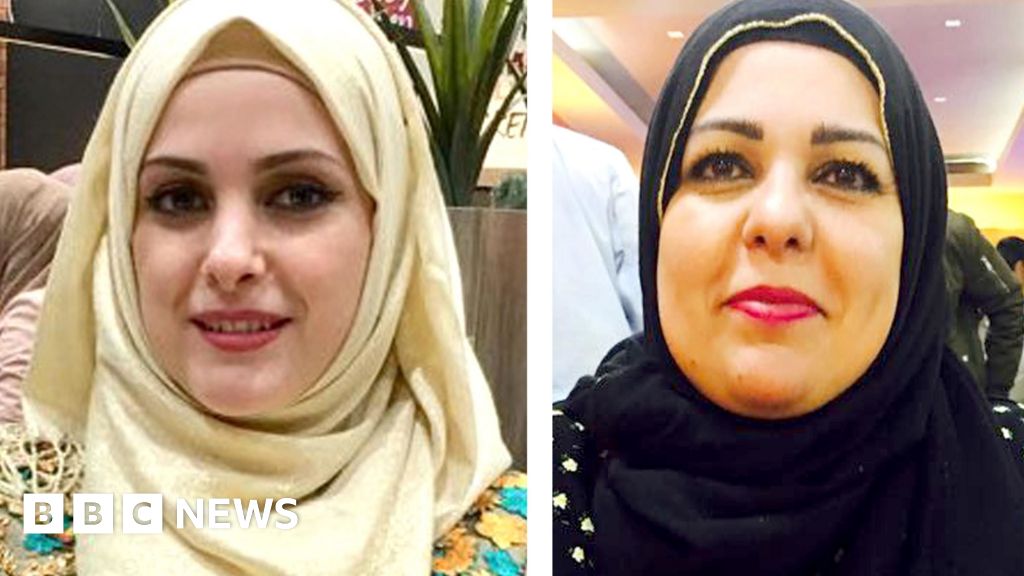
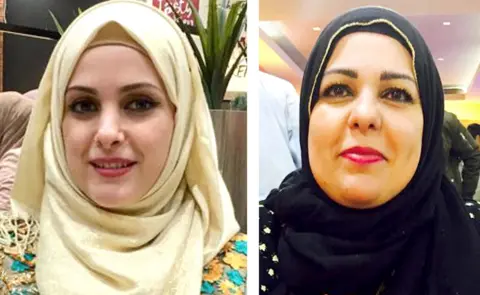 West Midlands Police/PA
West Midlands Police/PADomestic abuse specialists will be embedded in 999 control rooms in England and Wales as part of the government’s pledge to halve violence against women and girls in a decade.
The measure is part of “Raneem’s Law” in memory of Raneem Oudeh, 22, and her mother Khaola Saleem who were murdered by Ms Oudeh’s estranged husband in 2018.
The government also announced a new domestic abuse protection order pilot that will order more abusers to stay away from victims and impose tougher sanctions if they fail to do so.
Home Secretary Yvette Cooper said victims “need to know the police will be there for them” and if they come forward, any report “will be treated with the seriousness and urgency it deserves”.
“Failure to understand the seriousness of domestic abuse costs lives and far too many have already been lost,” Ms Cooper said.
The aim is for specialists with expertise in domestic abuse to be on hand in control rooms to ensure victims get a fast response from officers on the ground and are quickly referred to support services.
The scheme will be piloted in select police forces from early next year. Details on which forces are taking part in the pilot have not yet been announced.
Ms Cooper described the new measures as “vital” and “a personal priority for me”.
She told the BBC’s Laura Kuenssberg in January about her plans for the measures, which Labour also proposed in February.
Almost 100 domestic abuse-related offences were recorded by police every hour on average last year, the government said.
On the night Ms Oudeh and her mother were killed, she rang 999 multiple times, but officers failed to reach the two women in time.
In total, 13 reports were made to the police about concerns for her safety – but no arrests were made until it was too late.
An inquest found police errors “materially contributed” to their deaths. West Midlands Police has since apologised to the family.
Nour Norris, Ms Oudeh’s aunt and Mrs Saleem’s sister, said having domestic abuse specialists in control rooms would “save lives by making sure no warning signs are ignored, unlike in Raneem’s story”.
“Their suffering and the way the system failed them is something I will never forget,” Ms Norris said. “What started as a quest for justice for my family became a mission to improve outcomes for all domestic abuse victims everywhere.”
Ms Oudeh’s estranged husband, Janbaz Tarin, was jailed for a minimum of 32 years in December 2018, after admitting to the murders.
In another effort to protect women and girls, the government also announced a new domestic abuse protection order pilot that will start in November.
Police already have the power to legally order abusers not to contact or go within a certain distance of victims for up to 28 days.
The pilot will introduce no maximum time limit for orders, impose electronic tagging of offenders and require perpetrators to notify police of any change in name or address.
The new orders will cover all forms of domestic abuse, including violence, stalking and controlling behaviour.
Breaching an order will be a criminal offence punishable by up to five years in prison.
Victims and other third parties such as charities will also be able to apply directly for an order, rather than having to rely on police and criminal courts.
The new domestic abuse protection orders will be piloted by officers in Greater Manchester Police, the Metropolitan Police (South London Borough Command Unit) and British Transport Police.
Refuge, the charity which supports survivors of domestic violence, welcomed the changes but called for “far more detail on how these plans will be implemented and how staff will be safely recruited, vetted and most importantly trained”.
Refuge’s interim chief executive Abigail Ampofo warned that police rarely act on breaches of existing protection orders, making them often “worth little more than the paper they are written on”.
“We need a real sea change in internal policing culture and the police forces’ response to domestic abuse overall,” said Ms Ampofo.
Politics
Ben Jennings on Keir Starmer accepting hospitality tickets at Arsenal – cartoon
Politics
Interest rates ‘on path down’ despite hold at 5%, Bank of England chief says | Interest rates
The governor of the Bank of England has signalled readiness to resume interest rate cuts despite keeping borrowing costs unchanged on Thursday at 5%, amid concerns over lingering high inflation.
Andrew Bailey said the central bank was “now gradually on the path down” from borrowing costs that were among the highest since before the 2008 financial crisis. “I think interest rates are going to come down, I’m optimistic on that front,” he said.
Earlier on Thursday, the Bank’s monetary policy committee (MPC) had voted by a majority of eight to one against launching a back-to-back reduction in interest rates, pausing its efforts to ease the pressure on household budgets.
Last month, the Bank cut interest rates for the first time since the Covid pandemic was declared four years ago, after a sharp fall in inflation from a peak of more than 11% in late 2022 – the highest level since the early 1980s.
Bailey said that while inflationary pressures had continued to ease, he wanted to caution people against expectations of a rapid easing of monetary policy. “We need to be careful not to cut too fast or by too much,” he said.
The annual rate of inflation remained unchanged at 2.2% in August, marginally above the Bank’s 2% inflation target.
The decision to keep rates on hold had been widely expected in the City. The pound jumped to its highest level against the dollar since March 2022 after the Bank’s decision, hitting $1.33.
The US Federal Reserve cut interest rates by half a percentage point on Wednesday, the first reduction in four years, as the world’s most powerful central bank stepped back from its aggressive bid to cool inflation in the US economy. The European Central Bank has also cut interest rates twice, by a quarter of a percentage point at non-consecutive policy meetings.
Most economists predict the Bank will resume cutting rates within months should inflationary pressures in the UK economy continue to fade, with financial markets pricing in the expectation of a further quarter-point reduction in borrowing costs to 4.75% at its next policy meeting in November.
Since cutting interest rates last month, the MPC said inflationary pressures had continued to ease as expected. One member of the committee, the independent economist Swati Dhingra, voted for another immediate quarter-point cut in borrowing costs, going against most of the nine-strong panel.
However, the Bank said headline inflation was on track to rise to about 2.5% before the end of this year – a marginally lower level than it anticipated in August – amid resilient price growth in the UK service sector and a tight jobs market.
In the minutes of its meeting, the MPC said: “Monetary policy would need to continue to remain restrictive for sufficiently long enough until the risks to inflation returning sustainably to the 2% target in the medium term had dissipated further.”
Highlighting concerns over inflation above the 2% target, the central bank said it would maintain a process of selling government bonds amassed on its balance sheet under its crisis-era quantitative easing programme.
Threadneedle Street said it would reduce the stock of UK government bonds by £100bn over the next year, aiming to reduce the total amount to £558bn. At its peak, the Bank held up to £895bn of bonds, in a policy designed to lower borrowing costs and keep markets functioning efficiently during the 2008 financial crisis and the peak of the Covid pandemic.
The development is likely to be closely watched by the chancellor, Rachel Reeves, before next month’s budget, amid speculation she could change the government’s self-imposed fiscal rules to exclude the impact of the Bank’s quantitative easing programme.
Some economists have suggested such a change could open up additional headroom of about £20bn.
Andrew Goodwin, chief UK economist at the consultancy Oxford Economics, said that although the Bank had paused its round of interest rate cuts, it would probably resume its efforts at the MPC’s next policy meeting in November.
“We regard another rate cut in November as almost certain,” he said. “There’s also been a clear change of tone by central banks globally in recent months, moving from a total focus on inflation towards giving greater consideration to growth concerns.”
-

 Sport5 hours ago
Sport5 hours agoJoshua vs Dubois: Chris Eubank Jr says ‘AJ’ could beat Tyson Fury and any other heavyweight in the world
-

 News1 day ago
News1 day agoYou’re a Hypocrite, And So Am I
-

 Technology4 hours ago
Technology4 hours agoiPhone 15 Pro Max Camera Review: Depth and Reach
-

 News6 hours ago
News6 hours agoIsrael strikes Lebanese targets as Hizbollah chief warns of ‘red lines’ crossed
-

 Sport5 hours ago
Sport5 hours agoUFC Edmonton fight card revealed, including Brandon Moreno vs. Amir Albazi headliner
-

 CryptoCurrency4 hours ago
CryptoCurrency4 hours agoEthereum is a 'contrarian bet' into 2025, says Bitwise exec
-

 CryptoCurrency5 hours ago
CryptoCurrency5 hours ago2 auditors miss $27M Penpie flaw, Pythia’s ‘claim rewards’ bug: Crypto-Sec
-

 CryptoCurrency5 hours ago
CryptoCurrency5 hours agoTreason in Taiwan paid in Tether, East’s crypto exchange resurgence: Asia Express
-

 CryptoCurrency5 hours ago
CryptoCurrency5 hours agoLeaked Chainalysis video suggests Monero transactions may be traceable
-

 CryptoCurrency5 hours ago
CryptoCurrency5 hours agoJourneys: Robby Yung on Animoca’s Web3 investments, TON and the Mocaverse
-

 CryptoCurrency5 hours ago
CryptoCurrency5 hours agoAre there ‘too many’ blockchains for gaming? Sui’s randomness feature: Web3 Gamer
-

 CryptoCurrency5 hours ago
CryptoCurrency5 hours agoCrypto whales like Humpy are gaming DAO votes — but there are solutions
-

 CryptoCurrency5 hours ago
CryptoCurrency5 hours agoHelp! My parents are addicted to Pi Network crypto tapper
-

 CryptoCurrency5 hours ago
CryptoCurrency5 hours ago‘Everything feels like it’s going to shit’: Peter McCormack reveals new podcast
-

 CryptoCurrency5 hours ago
CryptoCurrency5 hours agoSEC sues ‘fake’ crypto exchanges in first action on pig butchering scams
-

 CryptoCurrency5 hours ago
CryptoCurrency5 hours agoDecentraland X account hacked, phishing scam targets MANA airdrop
-
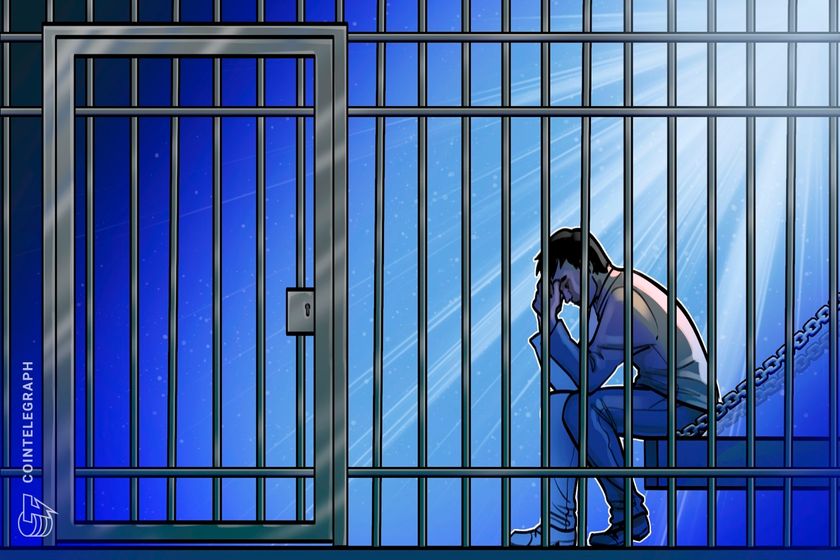
 CryptoCurrency5 hours ago
CryptoCurrency5 hours agoBinance CEO says task force is working ‘across the clock’ to free exec in Nigeria
-

 CryptoCurrency5 hours ago
CryptoCurrency5 hours agoBitcoin price hits $62.6K as Fed 'crisis' move sparks US stocks warning
-

 CryptoCurrency5 hours ago
CryptoCurrency5 hours agoCZ and Binance face new lawsuit, RFK Jr suspends campaign, and more: Hodler’s Digest Aug. 18 – 24
-

 CryptoCurrency5 hours ago
CryptoCurrency5 hours agoBitcoin miners steamrolled after electricity thefts, exchange ‘closure’ scam: Asia Express
-

 CryptoCurrency5 hours ago
CryptoCurrency5 hours agoCertiK Ventures discloses $45M investment plan to boost Web3
-

 CryptoCurrency5 hours ago
CryptoCurrency5 hours agoMemecoins not the ‘right move’ for celebs, but DApps might be — Skale Labs CMO
-

 CryptoCurrency5 hours ago
CryptoCurrency5 hours agoDorsey’s ‘marketplace of algorithms’ could fix social media… so why hasn’t it?
-

 CryptoCurrency5 hours ago
CryptoCurrency5 hours agoLow users, sex predators kill Korean metaverses, 3AC sues Terra: Asia Express
-

 CryptoCurrency5 hours ago
CryptoCurrency5 hours agoSEC asks court for four months to produce documents for Coinbase
-

 CryptoCurrency5 hours ago
CryptoCurrency5 hours agoBlockdaemon mulls 2026 IPO: Report
-

 Science & Environment8 hours ago
Science & Environment8 hours ago‘Running of the bulls’ festival crowds move like charged particles
-

 MMA5 hours ago
MMA5 hours agoUFC’s Cory Sandhagen says Deiveson Figueiredo turned down fight offer
-

 MMA5 hours ago
MMA5 hours agoDiego Lopes declines Movsar Evloev’s request to step in at UFC 307
-

 Football5 hours ago
Football5 hours agoNiamh Charles: Chelsea defender has successful shoulder surgery
-

 Football5 hours ago
Football5 hours agoSlot's midfield tweak key to Liverpool victory in Milan
-

 Science & Environment8 hours ago
Science & Environment8 hours agoRethinking space and time could let us do away with dark matter
-

 Science & Environment8 hours ago
Science & Environment8 hours agoHow one theory ties together everything we know about the universe
-

 News3 hours ago
News3 hours agoBrian Tyree Henry on voicing young Megatron, his love for villain roles
-

 Science & Environment5 hours ago
Science & Environment5 hours agoWe may have spotted a parallel universe going backwards in time
-

 CryptoCurrency5 hours ago
CryptoCurrency5 hours agoArthur Hayes’ ‘sub $50K’ Bitcoin call, Mt. Gox CEO’s new exchange, and more: Hodler’s Digest, Sept. 1 – 7
-

 CryptoCurrency5 hours ago
CryptoCurrency5 hours agoLouisiana takes first crypto payment over Bitcoin Lightning
-

 CryptoCurrency5 hours ago
CryptoCurrency5 hours agoCrypto scammers orchestrate massive hack on X but barely made $8K
-

 CryptoCurrency5 hours ago
CryptoCurrency5 hours ago$12.1M fraud suspect with ‘new face’ arrested, crypto scam boiler rooms busted: Asia Express
-

 CryptoCurrency5 hours ago
CryptoCurrency5 hours agoReal-world asset tokenization is the crypto killer app — Polygon exec
-

 Science & Environment8 hours ago
Science & Environment8 hours agoFuture of fusion: How the UK’s JET reactor paved the way for ITER
-

 CryptoCurrency5 hours ago
CryptoCurrency5 hours agoFed rate cut may be politically motivated, will increase inflation: Arthur Hayes
-

 CryptoCurrency5 hours ago
CryptoCurrency5 hours agoCardano founder to meet Argentina president Javier Milei
-

 CryptoCurrency5 hours ago
CryptoCurrency5 hours agoTelegram bot Banana Gun’s users drained of over $1.9M
-

 CryptoCurrency5 hours ago
CryptoCurrency5 hours agoVonMises bought 60 CryptoPunks in a month before the price spiked: NFT Collector
-

 CryptoCurrency5 hours ago
CryptoCurrency5 hours agoVitalik tells Ethereum L2s ‘Stage 1 or GTFO’ — Who makes the cut?
-
Business4 hours ago
How Labour donor’s largesse tarnished government’s squeaky clean image
-
Business4 hours ago
UK hospitals with potentially dangerous concrete to be redeveloped
-
Business3 hours ago
Axel Springer top team close to making eight times their money in KKR deal
-

 News3 hours ago
News3 hours ago“Beast Games” contestants sue MrBeast’s production company over “chronic mistreatment”
-

 News3 hours ago
News3 hours agoSean “Diddy” Combs denied bail again in federal sex trafficking case
-

 News3 hours ago
News3 hours agoSean “Diddy” Combs denied bail again in federal sex trafficking case in New York
-

 News3 hours ago
News3 hours agoBrian Tyree Henry on his love for playing villains ahead of “Transformers One” release
-

 News3 hours ago
News3 hours agoBrian Tyree Henry on voicing young Megatron, his love for villain roles
-
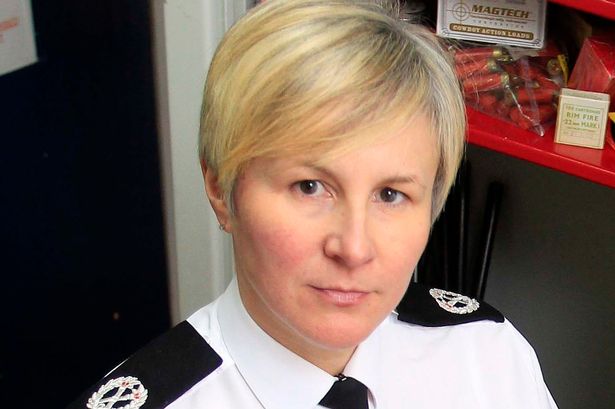
 News7 hours ago
News7 hours agoPolice chief says Daniel Greenwood 'used rank to pursue junior officer'
-

 Technology3 days ago
Technology3 days agoYouTube restricts teenager access to fitness videos
-

 News7 hours ago
News7 hours agoChurch same-sex split affecting bishop appointments
-

 Science & Environment8 hours ago
Science & Environment8 hours agoPhysicists have worked out how to melt any material
-
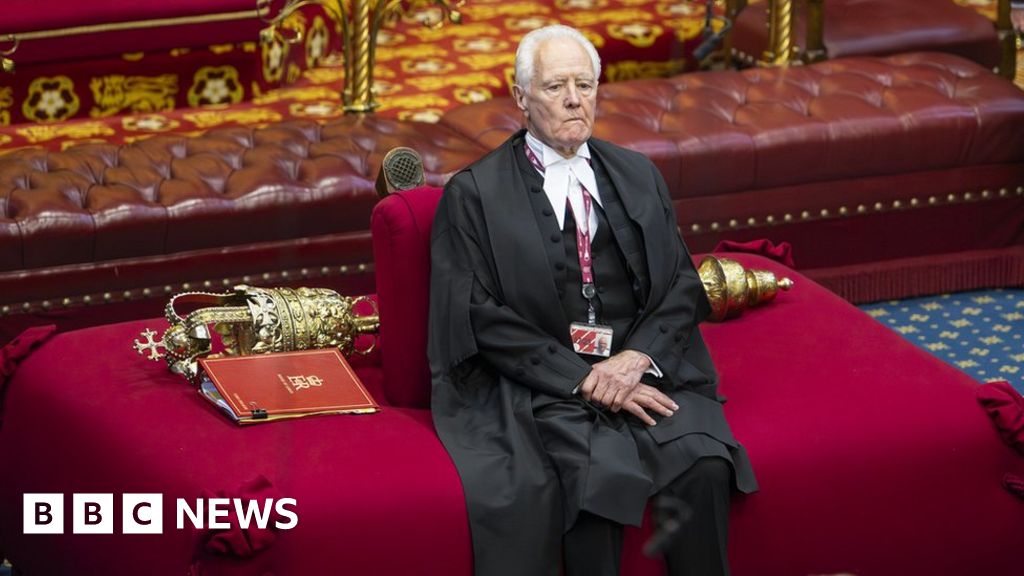
 Politics19 hours ago
Politics19 hours agoWhat is the House of Lords, how does it work and how is it changing?
-
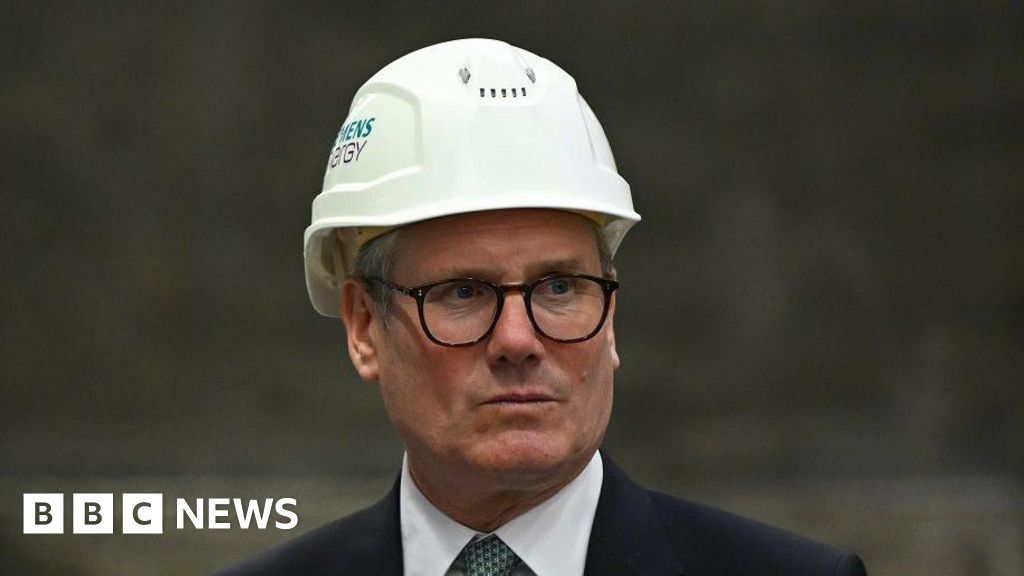
 Politics20 hours ago
Politics20 hours agoKeir Starmer facing flashpoints with the trade unions
-

 Technology6 hours ago
Technology6 hours agoFivetran targets data security by adding Hybrid Deployment
-
News5 hours ago
Freed Between the Lines: Banned Books Week
-

 Sport5 hours ago
Sport5 hours agoUFC’s Dan Ige feels confident after Diego Lopes dominates Brian Ortega
-

 MMA5 hours ago
MMA5 hours agoConor McGregor denies allegation he sexually assaulted woman at NBA Finals
-

 Football5 hours ago
Football5 hours agoFootball Daily
-

 Science & Environment8 hours ago
Science & Environment8 hours agoHow to wrap your head around the most mind-bending theories of reality
-

 Fashion Models4 hours ago
Fashion Models4 hours agoMiranda Kerr nude
-

 Fashion Models4 hours ago
Fashion Models4 hours ago“Playmate of the Year” magazine covers of Playboy from 1971–1980
-

 Health & fitness1 day ago
Health & fitness1 day ago11 reasons why you should stop your fizzy drink habit in 2022
-

 Politics4 hours ago
Politics4 hours agoLabour MP urges UK government to nationalise Grangemouth refinery
-
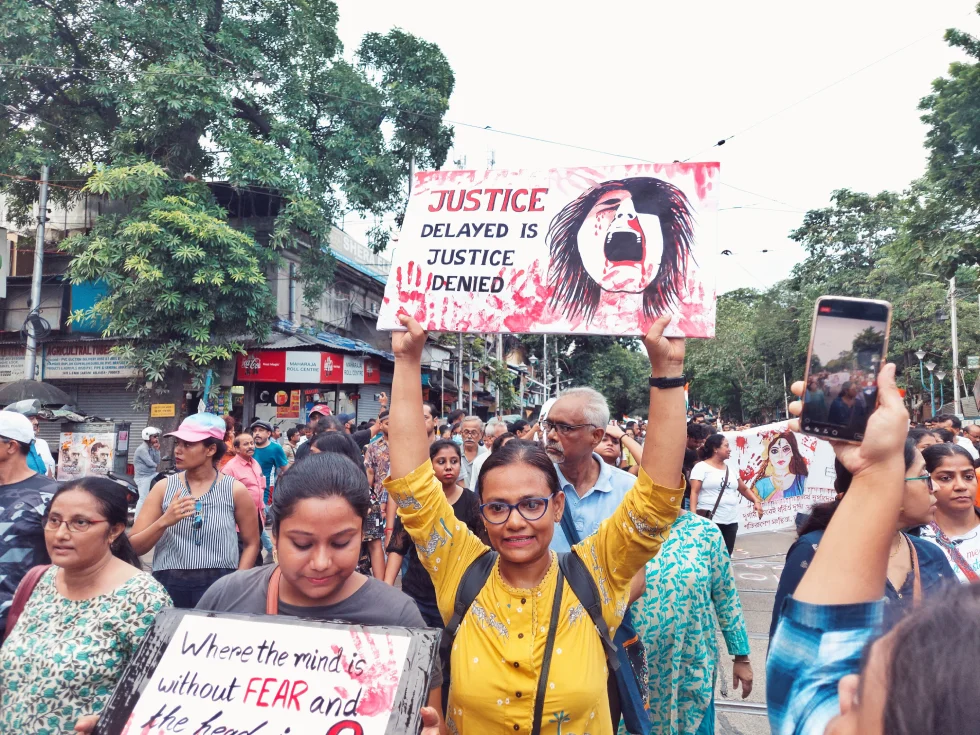
 News4 days ago
News4 days agoIndia Now Moves from Deliberations to Deliverables on Crimes Against Women
-

 Science & Environment7 hours ago
Science & Environment7 hours agoOdd quantum property may let us chill things closer to absolute zero
-

 Science & Environment14 hours ago
Science & Environment14 hours agoQuantum forces used to automatically assemble tiny device
-

 Entertainment3 hours ago
Entertainment3 hours ago“Jimmy Carter 100” concert celebrates former president’s 100th birthday
-
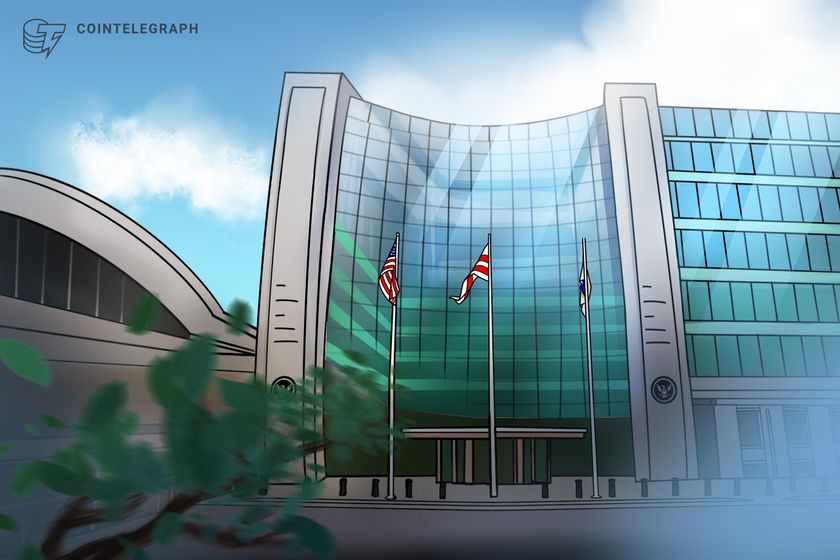
 CryptoCurrency5 hours ago
CryptoCurrency5 hours agoSEC settles with Rari Capital over DeFi pools, unregistered broker activity
-

 Science & Environment16 hours ago
Science & Environment16 hours agoSunlight-trapping device can generate temperatures over 1000°C
-

 News3 hours ago
News3 hours agoJoe Posnanski revisits iconic football moments in new book, “Why We Love Football”
-

 Health & fitness2 days ago
Health & fitness2 days agoHow to adopt mindful drinking in 2022
-

 Health & fitness2 days ago
Health & fitness2 days agoWhen Britons need GoFundMe to pay for surgery, it’s clear the NHS backlog is a political time bomb
-

 Science & Environment18 hours ago
Science & Environment18 hours agoQuantum to cosmos: Why scale is vital to our understanding of reality
-

 Science & Environment1 day ago
Science & Environment1 day agoParticle physicists may have solved a strange mystery about the muon
-

 Science & Environment19 hours ago
Science & Environment19 hours agoHow the weird and powerful pull of black holes made me a physicist
-

 Science & Environment19 hours ago
Science & Environment19 hours agoQuantum time travel: The experiment to ‘send a particle into the past’
-

 Science & Environment18 hours ago
Science & Environment18 hours agoX-ray laser fires most powerful pulse ever recorded
-

 Science & Environment16 hours ago
Science & Environment16 hours agoDoughnut-shaped swirls of laser light can be used to transmit images
-

 Science & Environment16 hours ago
Science & Environment16 hours agoBeing in two places at once could make a quantum battery charge faster
-

 Science & Environment14 hours ago
Science & Environment14 hours agoBlack holes scramble information – but may not be the best at it
-

 CryptoCurrency5 hours ago
CryptoCurrency5 hours agoBitcoin will ‘start ripping’ as Trump’s polls improve: Felix Hartmann, X Hall of Flame
-

 CryptoCurrency5 hours ago
CryptoCurrency5 hours agoTelegram CEO cannot leave France, OpenSea receives Wells notice, and more: Hodler’s Digest, Aug. 25 – 31
-
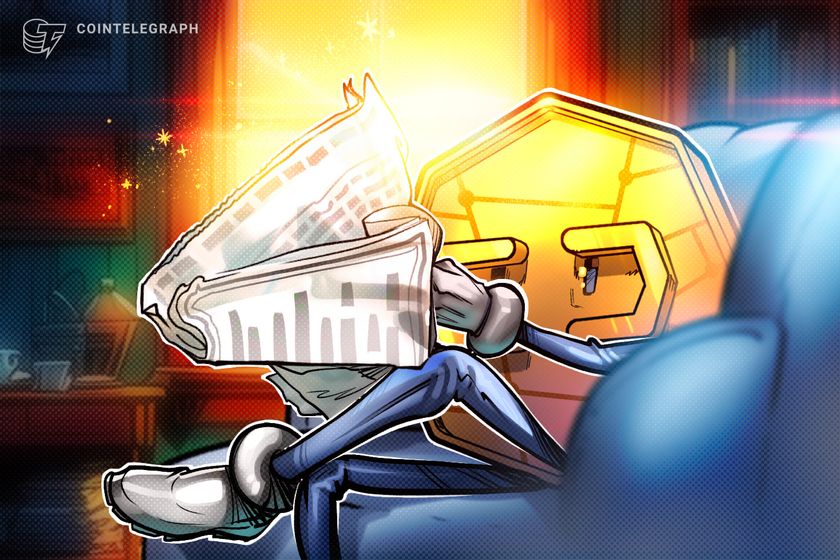
 CryptoCurrency5 hours ago
CryptoCurrency5 hours agoFive crypto market predictions that haven’t come true — yet
-

 CryptoCurrency5 hours ago
CryptoCurrency5 hours agoSolana unveils new Seeker device, says it’s not just a ‘memecoin phone’
-

 Science & Environment8 hours ago
Science & Environment8 hours ago‘Sound laser’ is the most powerful ever made
-

 Science & Environment8 hours ago
Science & Environment8 hours agoJupiter’s stormy surface replicated in lab
-

 Science & Environment8 hours ago
Science & Environment8 hours agoA tale of two mysteries: ghostly neutrinos and the proton decay puzzle
-
Politics8 hours ago
Owen Paterson loses ECHR appeal against report that preceded downfall | Owen Paterson
-

 CryptoCurrency5 hours ago
CryptoCurrency5 hours agoShift to new server provider restores X in Brazil for some users
-

 CryptoCurrency5 hours ago
CryptoCurrency5 hours agoBitcoin rallies to $61K, but derivatives traders are still skeptical — Here is why
-

 CryptoCurrency5 hours ago
CryptoCurrency5 hours agoDuckDuckGo ranks Etherscan phishing websites in top results
-

 CryptoCurrency5 hours ago
CryptoCurrency5 hours agoWeekend Wrap: Circle blacklists Lazarus, Ethereum researcher exits and more
-
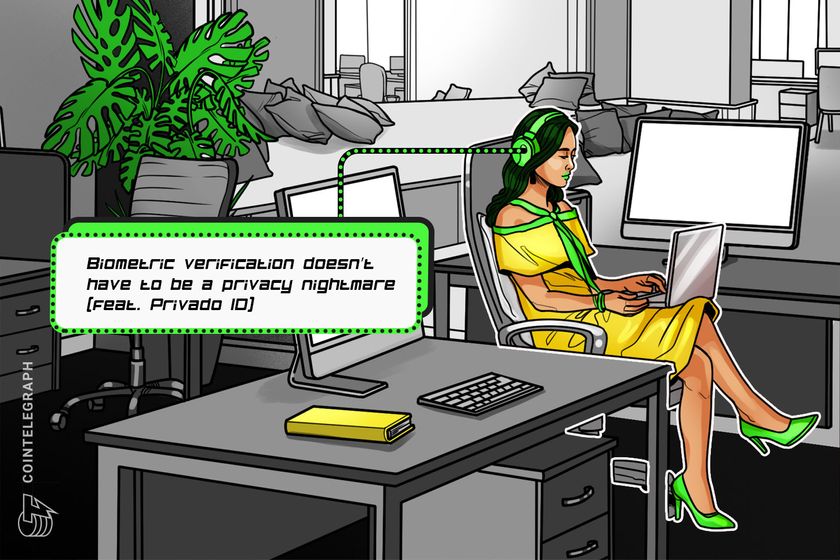
 CryptoCurrency5 hours ago
CryptoCurrency5 hours agoThe Agenda explores the future of biometrics, privacy and Big Tech with Privado


You must be logged in to post a comment Login